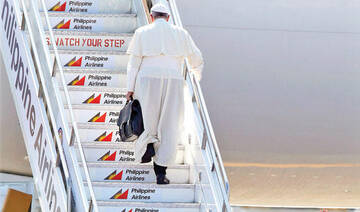BRATISLAVA: Slovakia’s Prime Minister Robert Fico remains in a serious condition and it is too soon to say whether he will recover, a deputy prime minister said on Thursday, a day after an assassination attempt that has sent shock waves across Europe.
The shooting was the first major assassination attempt on a European political leader for more than 20 years, and has drawn international condemnation. Political analysts and lawmakers say it has exposed an increasingly febrile and polarized political climate both in Slovakia and across Europe.
“Unfortunately, I cannot say yet that we are winning (the battle to save Fico) or that the prognosis is positive because the extent of the injuries caused by four gunshot wounds is so extensive that the body’s response will still be very difficult,” Deputy Prime Minister Robert Kalinak said.
Interior Minister Matus Sutaj Estok, speaking at the same news conference, said the shooter — whom police have charged with attempted murder — had acted alone and had previously taken part in anti-government protests.
“This is a lone wolf who had radicalized himself in the latest period after the presidential election (in April),” Sutaj Estok said.
The suspect listed government policies on Ukraine and its plans to reform the country’s public broadcaster and dismantle the special prosecutor’s office as reasons for the attack, the interior minister added.
Miriam Lapunikova, director of the F.D. Roosevelt University Hospital in Banska Bystrica where Fico is being treated, said the 59-year-old prime minister had undergone five hours of surgery with two teams to treat multiple gunshot wounds.
“At this point his condition is stabilized but is truly very serious, he will be in the intensive care unit,” she told reporters.
Slovak President Zuzana Caputova called for a calming of political tensions. Fico ally and President-elect Peter Pellegrini urged parties to suspend or tone down their campaigning for next month’s European Parliament elections.
“If there is anything the people of Slovakia urgently need today, it is at least a basic consensus and unity among Slovaks’ political representatives,” said Pellegrini, who won an April election for the mainly ceremonial post of president.
VETERAN LEADER
Fico has dominated Slovak politics for much of the past two decades, winning re-election last October for a fourth stint as premier.
He has fused left-leaning economic views with nationalism, tapping into widespread discontent over living standards, but has also proved a divisive figure. His critics say new reforms threaten the rule of law and media freedoms in Slovakia, a member state of the European Union and NATO.
Fico’s calls for ending sanctions on Russia and halting arms supplies to Ukraine have endeared him to Moscow, and President Vladimir Putin and other Russian politicians have been prominent among those condemning Wednesday’s assassination attempt.
Fico was shot while greeting supporters in the street after chairing a government meeting in the central town of Handlova.
Slovak news media reported that the 71-year-old gunman was a former security guard at a shopping mall, the author of three collections of poetry and a member of the Slovak Society of Writers. News outlet Aktuality.sk cited the suspect’s son as saying his father was the legal holder of a gun license.
There has been no official confirmation of the gunman’s identity and background.
The incident raised questions over Fico’s security arrangements, as the attacker managed to fire five shots at point blank range despite the prime minister being accompanied by several bodyguards.
In an undated video posted on Facebook, the alleged attacker was seen saying: “I do not agree with government policy” and criticizing government plans to revamp the public broadcaster.
Reuters verified the person in the video matched images of the man arrested after Fico’s shooting.
Fico and his government coalition allies have criticized sections of the media and the opposition, saying they had inflamed tensions in the central European state.
Slovakia’s biggest opposition party, the liberal, pro-Western Progressive Slovakia, was quick to condemn the shooting and called off a protest rally planned for Wednesday evening. It has also urged all politicians to avoid stoking tensions.


























